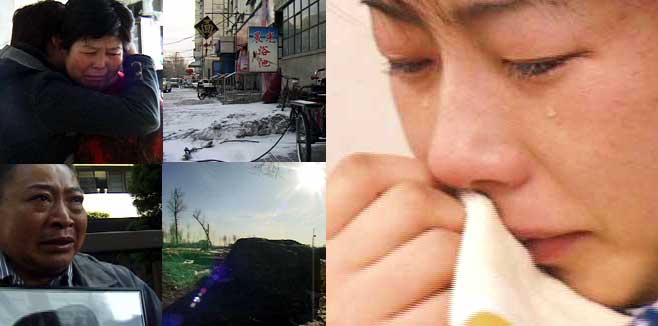
From the Land of Bitter Tears
Story:
The father of Liu Min, 27, died in 1995 in an accidental explosion of a bombshell left by the Japanese Imperial Army in WWII. His arms and legs blew off when the bomb suddenly exploded at a construction site. He suffered serious burns over his entire body and died 18 days later.
The money for his treatment left her with a huge debt when she was only a teenager. She and her brother had no choice but to leave school and work.
Li Cheng, 59, became victim of poison gas produced by the Japanese military when he touched a mysterious container while working on a dredge ship at the age of 29. Water blisters covered his body and his genitals and his internal organs were damaged. He still suffers from serious aftereffects. His wife supports them both and having fallen to a life of extreme poverty, he has attempted suicide twice.
On August 4, 2003, another container of poison gas was found in Qiqihar city in China, killing one person and leaving 43 people injured. Many still suffer from serious aftereffects. Sixty years have passed since the end of the war, but weapons discarded by the Japanese remain unearthed in the fields of China. Those remainders of the war still hurt people in these peaceful times. Please listen to what they have to say.
Background Information
omoko Kana, who traveled through China in 2003, met 27-year-oid Liu Min in Harbin. Deeply moved by Liu Min's tears, Kana decided to produce a documentary film of Chinese people suffering from discarded weapons. She spent 10 months and met with 60 victims. Some victims were suffering from the loss of their eyesight, and others losing their genitals, and one was killed after his lower body was blown off.
All of them had their future suddenly taken away in this era of peace.
In WWII, Japan made chemical weapons, breaking international treaties. From 1929 to 1945, Japan produced 6,000 tons of poison gas, including mustard and cyanide gas. After experimenting with chemical weapons on humans in China, Japan used these chemicals in actual warfare. Many people were injured, including Chinese citizens.
After its defeat, the Japanese military bombed the facilities and discarded the weapons in the fields before leaving.
They feared that their production would come to light.
After the war, the poison gas in Japan was disposed of under U.S occupation. However, the Japanese government admits that 700,000 shells sent to China still remain in the ground. Since the end of the war more than 2,000 people have been injured by these poisons.
Interest in discarded weapons remains high in China. Many journalists rushed to accompany Director Kana during her filming. After completion, China's largest TV station, CCTV, conducted a special program about the documentary film during prime time and invited Kana as a guest.

